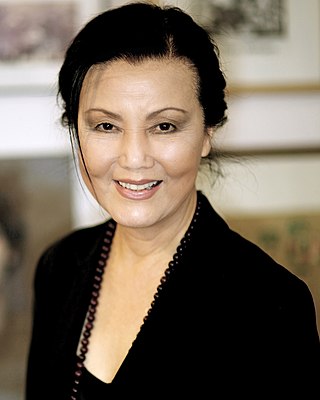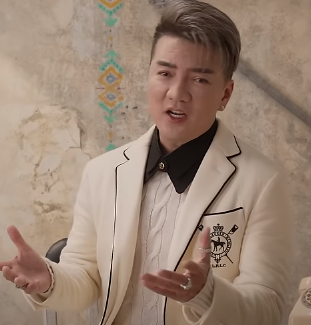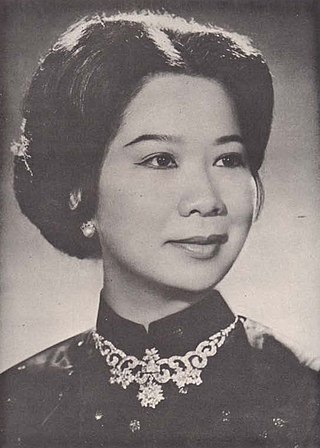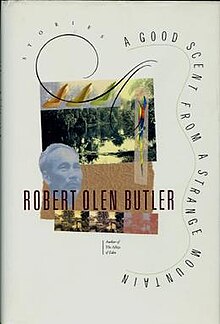Synopsis
Open Arms
The opening story is set during the Vietnam War. The narrator, a translator for the Australian forces, recounts the story of a North Vietnamese communist named Thập who joins the Australian forces as a spy after the communists massacre his family. When the Australian soldiers bring him to a screening of pornographic films, Thập seems overwhelmed and disgusted. The narrator speculates that, as a former Communist, he considers pornography immoral, and that it simultaneously reminds him of his longing for his dead wife. Thập later kills an Australian soldier and himself.
Mr. Green
"Mr. Green" is narrated by a Catholic woman who was taught by her grandfather about ancestor worship. As a child, she was saddened when her grandfather told her that she could not tend to the worship of her family members because she is a woman. Mr. Green is a talking parrot that belonged to her great grandfather; after his death, she cares for the parrot, bringing him to the United States with her. When Mr. Green grows old and melancholy, plucking out his own feathers, the narrator kills him by wringing his neck as she had learned from her mother and grandmother. This story is about gendered values. The narrator must come to terms with her grandfather's subtle misogyny and establish her own self-worth as a woman. This story focuses on the conflict between ancient, honourable but constricting values and the modern assertion of femininity. As the narrator leaves Vietnam, she takes a reminder of this bonding Confucian values with her in the form of Mr. Green. The death of Mr. Green is therefore symbolic.
The Trip Back
"The Trip Back" is about Kánh, who drives to the airport in order to pick up his wife's grandfather, Mr. Chinh. Kánh is shocked when he discovers that Mr. Chinh is chaperoned by his cousin Hương, and during his trip home realizes that Alzheimer's disease afflicts Mr. Chinh. Kánh is deeply disturbed by this and worries whether he could ever forget his wife, whom he deeply loves. The situation is compounded further when his wife realizes that her grandfather has no recollection of her.
Fairy Tale
The story is about a Vietnamese prostitute nicknamed Miss Noi who was brought to the United States as the wife of an American GI. She divorces her husband, becomes a prostitute again, and seems happy with her station in life. She meets a Vietnam War veteran named Mr. Fontenot who proposes to her with an apple and gives her a good life.
Crickets
"Crickets" is about a man named Ted (Thiệu) who tries to teach his Americanized son how to make crickets fight, which was a favorite game of Ted's as a boy in Vietnam. His son is uninterested and Thiệu eventually gives up.
Thiệu and his new bride had escaped from Vietnam and ended up in the state of Louisiana, where the land was very much like the Mekong Delta. They struggled to adapt to the new land and language, while their American-born son, Bill, adapted easily but had little knowledge of his Vietnamese cultural background. Despite barriers of age and language, Thiệu tries to educate his son to be more Vietnamese.
Letters From My Father
"Letters From My Father" is the story of a Vietnamese teenager who has grown up without her American father. After the father arranges for his wife and daughter to come to the United States, he is unsure of how to react to his daughter, because all that he knows of her is from pictures and letters. His daughter learns more from her father by discovering some letters that he had written to the United States government in which he angrily and poetically demands his daughter's release, and she longs for him to love her in the way that he expressed his love in those letters.
Love
"Love" is about a former Vietnamese spy who has a beautiful wife, Bướm. As a spy in Vietnam, he was able to direct U.S. missiles onto the homes of men who aroused his jealousy by looking at or flirting with his wife. After moving to New Orleans, he suspects his wife of having an affair with a Vietnamese restaurant owner and consults a voodoo practitioner.
Preparation
A woman readying her friend's corpse for burial combs and envies the beautiful hair she combed when they were girls in Saigon.
Mid-Autumn and In the Clearing
The stories "Mid-Autumn" and "In the Clearing" are similar in that they deal heavily in Vietnamese mysticism. Both are dialogues between parent and child and make reference to supernatural beings. "Mid-Autumn" is about a mother's first love lost; "In the Clearing" is an apology from father to son for having to leave his family in Vietnam.
A Ghost Story
In "A Ghost Story", a man tells a story, which he claims he knows to be true, about the spirit of a beautiful woman who saves men from disaster and then reappears to eat them.
Snow
"Snow" is the story of a woman named Giàu who works as a waitress in a Chinese restaurant. A Jewish lawyer named Cohen who shares with Giàu a fear of snow talks to her as he waits for his takeaway meal on Christmas Eve. They realize that despite their different backgrounds, they have several things in common, and they arrange to go on a date.
The American Couple
"The American Couple" is the longest story in the collection at 80 pages. It is narrated by a Vietnamese woman named Gabrielle on vacation in Puerto Vallarta, Mexico. They meet an American couple, Frank and Eileen. Frank is a Vietnam veteran who is eager to talk about his experiences. Vinh and Frank begin a strange and secretive relationship in which hostilities are sometimes manifested concerning their respective roles in the Vietnam War. The story is told from the perspective of Vinh's wife, who has had little access to her husband's experiences as a soldier. It is an outsider's perspective of Vietnam veterans, and Frank and Vinh are observed at a distance.
A Good Scent from a Strange Mountain
"A Good Scent from a Strange Mountain" is the final story. It involves a grandfather, slowly dying, and seeing the vision of Ho Chi Minh, with whom he worked and lived. The politics of the Vietnamese refugees continue after they have arrived in America, as their new home country looks to deal with the newly Communist united Vietnam.
Salem
"Salem", added to later editions of the collection, is a story of a Vietnamese soldier that works alone in the jungles of Vietnam and assassinates American soldiers that stumble on his path. His job is to kill American soldiers and take the items they carry with them and hand the items over to the government so that they can identify the American soldier. The Vietnamese soldier recovers a pack of Salem cigarettes from a dead American soldier he has just killed. In the pack of cigarettes is a photograph of the dead American soldier's wife.
Missing
"Missing" is one of the two additional stories added in the later editions. This story is about an American soldier who stayed in Vietnam after the war and married a Vietnamese girl. The American soldier sees a photo of his face in a newspaper titled Missing. Because of this, he suspects that he is missing in Vietnam.

Kieu Chinh is a Vietnamese-American actress, producer, humanitarian, lecturer and philanthropist.

Robert Olen Butler is an American fiction writer. His short-story collection A Good Scent from a Strange Mountain was awarded the Pulitzer Prize for fiction in 1993.
Vietnamese literature is the literature, both oral and written, created largely by the Vietnamese. Early Vietnamese literature has been greatly influenced by Chinese literature. As Literary Chinese was the formal written language for government documents, a majority of literary works were composed in Hán văn or as văn ngôn. From the 10th century, a minority of literary works were composed in chữ Nôm, the former writing system for the Vietnamese language. The Nôm script better represented Vietnamese literature as it led to the creation of different poetic forms like Lục bát and Song thất lục bát. It also allowed for Vietnamese reduplication to be used in Vietnamese poetry.

Anna Chennault, born Chan Sheng Mai, 陳香梅, also known as Anna Chan Chennault or Anna Chen Chennault, was a war correspondent and prominent Republican member of the U.S. China Lobby. She was married to American World War II aviator General Claire Chennault.

The cinema of Vietnam originates in the 1920s and was largely influenced by wars that have been fought in the country from the 1940s to the 1970s.

Lê Văn Hưng was an infantry general of the Army of the Republic of Vietnam. Hưng was perhaps best known as the "Hero of An Lộc" in 1972 when he commanded the 5th Division in defense of the city of An Lộc from the coordinated attacks of the North Vietnamese People's Army of Vietnam (PAVN) forces in the Battle of An Lộc.

Emperor Quang Trung or Nguyễn Huệ, also known as Nguyễn Quang Bình, or Hồ Thơm was the second emperor of the Tây Sơn dynasty, reigning from 1788 until 1792. He was also one of the most successful military commanders in Vietnam's history. Nguyễn Huệ and his brothers, Nguyễn Nhạc and Nguyễn Lữ, together known as the Tây Sơn brothers, were the leaders of the Tây Sơn rebellion. As rebels, they conquered Vietnam, overthrowing the imperial Later Lê dynasty and the two rival feudal houses of the Nguyễn in the south and the Trịnh in the north.

Huỳnh Minh Hưng, commonly known by his stage name Đàm Vĩnh Hưng, often referred to by his nickname Mr. Dam, is a Vietnamese singer. He won 2 Dedication awards and multiple awards in Vietnam. Besides V-pop, he also performed many pre-war songs, Trinh Cong Son's songs and yellow music. He is one of the most highly paid singers in Vietnam and some of his alleged statements have appeared in tabloids.

Quốc Ân Temple is a Buddhist temple in the city of Huế, central Vietnam.

Nguyễn Thị Mai Anh, commonly known as Madame Nguyễn Văn Thiệu, served as First Lady of South Vietnam from 1967 to 1975.

The Voice of Vietnam is a reality television singing competition created by Endemol. It premiered in Vietnam in July 2012 on Vietnam Television. The format is Dutch and the original Dutch version of the programme was broadcast in the Netherlands for the first time in 2010 as The Voice of Holland. The programme was commissioned after a successful first season in the United States, where it aired on NBC domestically and AXN Asia regionally. It is produced by Cát Tiên Sa.
Ho Chi Minh Thought is a political philosophy that builds upon Marxism–Leninism and the ideology of Vietnamese revolutionary Ho Chi Minh. It was developed and codified by the Communist Party of Vietnam and formalised in 1991. The term is used to cover political theories and policies considered as representing a form of Marxism–Leninism that has been adapted to Vietnamese circumstances and history. The ideology includes views on the basic issues of the Vietnamese Revolution, specifically the development and application of Marxism–Leninism to the material conditions of Vietnam.

Vietnam Television, sometimes also unofficially known as the National Television, Saigon Television or Channel 9, was one of two national television broadcasters in South Vietnam from February 7, 1966, until just before the Fall of Saigon on April 29, 1975. It was the first television broadcaster in Vietnam.

The House of Nguyễn Phúc, also known as the House of Nguyễn Phước, is a family and a branch of the surname Nguyễn in Vietnam. Its members were the Nguyễn lords and emperors of the Nguyễn dynasty (1802-1945). Its Bảo Đại was also emperor of the State of Vietnam and Domain of the Crown (1949-1955). Nguyễn Bặc (924-979), an official of the Đinh dynasty, was its founder.
Son Kuy or Chavay Kuy, also known as Oknha Son Kuy, was the governor of the Khmer province of Trapeang. He was beheaded by Emperor Thiệu Trị of the Nguyễn dynasty in 1841, in exchange for preserving the cultural tradition for the Khmer Krom. Nowadays, the figure of Chavay Kuy has become a rallying call and a symbol of the separatist intent of the current Khmer Krom.

Yellow Flowers on the Green Grass is a 2015 Vietnamese film. It was adapted from the novel of the same name by Nguyễn Nhật Ánh. It was directed by Victor Vũ and produced by Galaxy Media & Entertainment Saigon Concert, Phương Nam Film, PS Việt Nam and K+ Television channel. It premiered at the Cannes Film Festival 2015 and was released in theaters on 2 October 2015. It was selected as the Vietnamese entry for the Best Foreign Language Film at the 89th Academy Awards but it was not nominated. On December 5 during the 19th Vietnam Film Festival, the movie was awarded the golden lotus.

Thich Phuoc Ngoc or Dhammananda Thero Thich Phuoc Ngoc - a Buddhist monk is a Venerable of Sri Lanka Buddhist Sangha. He has been known for positive contributions to humanitarian and social security activities, is the founder of the first Buddhist orphanage in Vietnam.

The seals of the Nguyễn dynasty can refer to a collection of seals specifically made for the emperors of the Nguyễn dynasty, who reigned over Vietnam between the years 1802 and 1945, or to seals produced during this period in Vietnamese history in general.

The abdication of Bảo Đại took place on 25 August 1945 and marked the end of the 143-year reign of the Nguyễn dynasty over Vietnam ending the Vietnamese monarchy. The fall of the Nguyễn dynasty also led to the fall of its Empire of Vietnam de facto controlled by Japan. Emperor Bảo Đại abdicated in response to the August Revolution. A ceremony was held handing power over to the newly established Democratic Republic of Vietnam, which was established during the end of World War II in Asia as Vietnam had been occupied by French and later Japanese imperialists.

The 3rd Central Committee of the Workers' Party of Vietnam (WPV) was elected at the 3rd WPV National Congress. It elected the 3rd Politburo and the 3rd Secretariat.



















